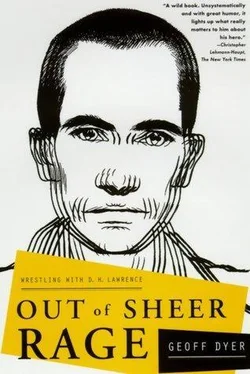Writers always envy artists, would trade places with them in a moment if they could. The painter’s life seems less ascetic, less monkish, less hunched. Instead of the austere mess of the desk there is the chaos of the studio: dirty coffee cups, paint-smudged cassette decks, drawings of the artist’s girlfriend, naked, on the walls. It starts at school, this association of writing with work and art with fun: the classroom is a site of boredom and order, the art room a place to play, to mess around, to make a mess; Double Physics was the low point in the school timetable but Double Art — more even than Games which often involved exposure to harsh weather conditions and the possibility of physical injury — signalled an hour and a half of not having to work. For the writer, work is characterised by the absolute cessation of physical movement (all movement is an evasion of and distraction from the job in hand), by a suspension of life. For the painter work means a more intense physical engagement in life, it begins with carpentry (making stretchers) and ends in glazing, varnishing and framing. Even though it thereby involves labour the painter’s work — or so it seems to the writer — never seems like work. In the age of the computer the writer’s office or study will increasingly resemble the customer service desk of an ailing small business. The artist’s studio, though, is still what it has always been: an erotic space. For the writer the artist’s studio is, essentially, a place where women undress. Van Gogh may have warned that ‘painting and fucking a lot don’t go together’ but the smell of white spirits and paint is suggestive of nothing else so much as afternoon sex. Personally, I would love to have been a painter.
One of the reasons that writers — rather than art critics — have written so well about artists and painting is that they retain these delusions (for such, artists assure me, they are) about picture-making. When writers write about painting they are in a sense on vicarious holiday. Lawrence, of course, went further. He not only produced some of the best writing on art in English — the ‘Introduction to his Paintings’ is a small, mad masterpiece — he also became a painter.
In the last years of his life painting was a greater source of fulfilment, on a day-to-day basis, than writing. What does it matter whether they are any good, these paintings? It never occurred to Lawrence to wonder whether he could paint or not. When, in the ‘Introduction to his Paintings’, he implicitly argued that the tradition of painting culminated in his own work, he was also arguing that an ability to paint was not the most important part of being a painter. Lawrence took his painting seriously, pursued it strenuously, but it always retained something of its idyllic character: ‘Painting is a much more amusing art than writing, and much less to it, costs one less, amuses one more.’ Painting was the absolute fulfilment of his ideals of work: to work to become more himself. In the same way that the photograph of Lawrence sitting by the tree — and not writing — was the idyllic image of the writer then the crowning achievement of his career as a writer was that he became a painter.
According to Huxley, Lawrence possessed ‘an even more remarkable accomplishment’ than an ability to paint: ‘He knew how to do nothing. He could just sit and be perfectly content.’
Not like me. I am always on the edge of what I am doing. I do everything badly, sloppily, to get it over with so that I can get on to the next thing that I will do badly and sloppily so that I can then do nothing — which I do anxiously, distractedly, wondering all the time if there isn’t something else I should be getting on with. ‘Being with you is like licking sugar through a glass,’ Laura once said. ‘You’re never quite there.’ When I’m working I’m wishing I was doing nothing and when I’m doing nothing I’m wondering if I should be working. I hurry through what I’ve got to do and then, when I’ve got nothing to do, I keep glancing at the clock, wishing it was time to go out. Then, when I’m out, I’m wondering how long it will be before I’m back home.
The moment I finish this study, all books by and about Lawrence will be returned to the shelves that my father and I built. It’s a pleasing prospect. If there’s one thing that keeps me banging away at this study, in fact, it is the knowledge that one day I will be able to put all those books back on the shelf between Larkin and Lessing and, later, hopefully, will be able to put this one up there too. Essentially, I want things over with : I wanted to get the shelf-building over with so that I could get back to writing my book about Lawrence; now I want to get writing my book over with so that I can put it up on the shelves — and start another one.
What’s more I’ve got no intention of changing. This is my idea of contentment.
You see I’ve decided to butch it out, to go in the opposite direction to that suggested by yoga and meditation. The yoga-meditation-zen path leads to peace with the world and oneness with the infinite. Petty annoyances fade into insignificance, the ego dissolves, and you are left in a state of unruffled serenity and calm. Or so I gather. It’s never worked for me. Faced with the thousands of petty annoyances and grievances encountered in the course of a week I’ve often tried to respond with a shrugged ‘Who cares?’ I’ve said it over and over to myself like a mantra, ‘Who cares? Who cares?’ until I was practically screaming ‘Who cares? Who cares?’ Before you know it you are reproaching the world for not caring, shaking your fist at the heavens, demanding to know why no one cares.
That’s what I’m doing: shaking my fist at the world. I won’t let even the smallest grievance escape me. I’m going to seize on the most insignificant inconvenience, annoyance, hindrance, setback, disappointment and am going to focus all my rage, anger, bitterness and frustration on it. ‘I shall turn my head away,’ wrote Nietzsche. ‘Henceforth that will be my sole negation.’ Not me. I’m going to glare right back at it. It? Anything that gets my goat or pisses me off. Nothing will escape me.
Travelling by coach, for example, the zen thing to do, obviously, is to relax into passenger-limbo, empty your head of all worries about traffic hold-ups and roadworks and accept your fate. Not me. I monitor each second of the journey, looking out for seconds saved and lost. I sit at the front so that I can see the road ahead, monitor the speedometer and check that the driver is pushing the bus as hard as he can, so that I can check out traffic lights and sigh with relief when the driver gambles on the amber, or silently curse him when he is too cautiously obedient. If a passenger gets on and fumbles through his wallet for the right change, finds none and then pays by cheque I don’t even attempt to read my book and think of something else: I glare and rage and inwardly curse, I mutter beneath my breath and imagine myself getting up, bawling him out and throwing him off the bus. If I’m stuck in traffic I mutter and curse beneath my breath. If I am kept waiting at a shop or supermarket I curse and mutter beneath my breath. Whatever happens I curse and mutter beneath my breath. When I am not reacting to some immediate cause of anger I am rehearsing what I am going to say to X or Y the next time I see them, thinking how I’m really going to give them an earful so that beneath my breath there is a constant rumble of abuse. You fucking stupid twat, you slow-witted mother-fucking asshole, you fucking piece of shit. . That’s it, that’s what’s going on in my head. Laura has said that it is obvious I am a writer because as I walk along my lips move, as if I’m talking or thinking to myself, as if I’m inventing dialogue for a book or am mentally going over some passage I’ve written. Yes, that’s it exactly, I say, except this particular book consists entirely of variations on ‘you fucking stupid cunt, I’m going to smash your fucking head in if you don’t hurry up’. If anything goes wrong, anything at all, then I over-react terribly — in my head. On the surface I may grin and bear it but in my head I am thinking of wreaking a hideous vengeance on whoever it is that seems responsible for whatever small inconvenience I have suffered. A few days ago the local delicatessen had run out of the luxury doughnuts which I have for my elevenses and on which I depend utterly, just as I depend on my cornetti integrali from the Farnese when I am in Rome. Right, I thought to myself, turning on my heel and walking out, grim-faced and tight-lipped, I will return later in the day and burn the place to the ground with all the staff in it — friendly, charming staff, incidentally, who have often let me owe them money — so that they could experience a fraction of the pain that I had suffered by not being able to have my morning doughnut. It’s the same at the Caffè Farnese when I am in Rome. I never do these terrible things and so they are kept chained up in my head, causing untold wear and tear. All the damage I dream of inflicting on the various pastry-related premises where I have experienced disappointment is actually inflicting terrible damage on my head. Sometimes I think of explaining my situation to the staff at the Farnese or at my local delicatessen. ‘What you have to understand,’ I imagine myself saying, ‘is that I am allergic to disappointment. I have had so much disappointment in my life that the tiniest amount of it is now enough to drive me to despair. I am so brimful of disappointment that even one more tiny drop will send me spilling over the edge.’ But I don’t say that, of course, any more than I do go back and burn down the delicatessen or the Farnese. I keep all this rage in my head.
Читать дальше












